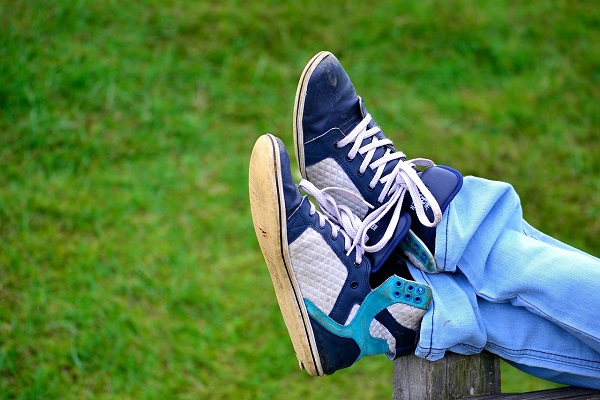It’s Saturday. My list of things that needed my attention was not only created—it was logged into my calendar complete with time projections to complete each item. Grocery shopping. Walk. Clean house. Bake cake. Create salad. Clean garage—a project started two weeks earlier. And, be ready by 5 pm for dinner and a play with my husband. Ta Dah! It was ambitious to say the least.
Although well intended, this particular day was a struggle. Grocery shopping—check. Walk—check. By mid-morning, my ambitious “to do” list had fallen apart. After a few late evenings with friends—and several early risings— I needed a nap!
In went my ear buds, up came my “going to sleep” meditation—my grand task list was history.
Small business owner rode hard & put out wet
I never used to indulge in such wasteful activity. I felt guilty. Self-care, accomplished with a much needed nap, was a rare event on my calendar. As a progeny of parents raised during the Great Depression, I learned well. The subtle talent of “taskmaster” was not lost in my upbringing.
Like many small business owners, Monday through Friday was dedicated to business—devoid of any personal activities. Anything house or family related (other than preparing meals) was left for weekends. This is the pattern I learned from hard-working parents.
Time to play, have fun, or relax was for when chores were done.
This discipline served me well for decades. It taught me the importance of work and dedication to business and family. I learned self-control, commitment, delayed gratification, organization, and time management—all qualities and skills responsible for much of my business success.
Over time, I also got sick. Struggled with fibromyalgia. Walked into rooms forgetting what I went in for. Grappled to find words to express myself. Ate all the wrong foods. Indulged in a little too much wine at the end of the day to relax. Seldom availed myself of exercise. I was crabby. In a word, I was miserable—and I was making sure my husband was, too. I was exhausted!
Why? The beliefs of my upbringing caused me to push beyond my physical capabilities. Growing up in farming country, we referred to that as a horse that’s been “rode hard and put out to pasture wet.”
I love what Robin Galloway, Associate Professor at Oregon State University Extension Service, says about Don’t Get Rode Hard and Put Away Wet.
Back in the old days, some folks reckoned an equine (horse, mule, or donkey) was just a disposable tool to get their jobs done. They might ride a horse hard, so it was sweaty, panting, and broken down. When done they would throw it out to pasture for flies to swarm and bite. Or they’d smack it on the butt and send it into the barn with saddle or harness marks plastering its stinky coat onto irritated skin. The animal would feel terrible and look horrible—it would be stiff and itchy, with sore spots. This is probably the origin of the expression to “get rode hard and put away wet.
Professionals in any field excel because they are dedicated to their jobs. This willingness to run hard often comes at the expense of our own needs and personal lives. The cynicism, depression, and lethargy of burnout can occur when you’re not in control of how you carry out your job, when you’re working toward goals that don’t resonate with you, and when you lack social support (Psychology Today, 2011). The pressure resulting from these demands can create a sense of physical and emotional exhaustion that often leads to burnout (Igodan & Newcomb, 1986). To survive this intense chosen profession, we have to take care of ourselves.
A small business owners #1 goal: Self-care
When I surfaced an hour later, I was actually surprised at how energized I felt. I was refreshed and eager to take on whatever was next. In fact, I looked forward to it!
As I reflected on my choice, I realized that I had truly learned to make self-care and vibrant health a priority. It was no longer something to long for—like when or if I retired. My health—and sanity —became a goal equally as valuable as any business goal. Finally!
It wasn’t easy nor did it happen over night—it happened over years.
Here are a few of the approaches and beliefs I’ve adopted that got me to the point of guilt-free weekends and weekdays!
- Let go of feeling guilty.
- Recognize the word “should” means someone else’s agenda—not mine.
- Set a schedule that brings out the best in me.
- Acknowledge that a nap sometimes IS the next best step.
- Align expectations (mine and others) with reality.
- Take my needs (and schedule) into consideration when making plans.
- Contemplate what is required of me before saying, “yes” to anything.
- Set health as a goal to be achieved complete with plan of action and calendared appointments for “me”.
- Appreciate that clients come and go, but without me there is no business—no family matriarch.
- Admit that the superhero pose doesn’t make me a superhero.
- Offer myself within my capacity and capabilities.
All of these little nuggets allow me to better aim for the objective of healthy living. And, does it ever feel good.
Alas, it’s not always smooth sailing. Occasionally I need to prompt myself, calm myself, and get myself back on track. However, as the saying goes, I’ve come a long way.
A Guide to a small business owners guilt-free living first appeared here.




No comments yet.